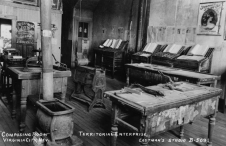Lucius Morris Beebe and Charles Clegg
Lucius Beebe and his lifelong companion, Charles Clegg, helped restore Virginia City, resuscitated the Territorial Enterprise, and promoted the Virginia and Truckee Railroad. Born in 1902 with Massachusetts aristocratic roots, Beebe flamboyantly disregarded authority from an early age. Although he won Yale's Richard Memorial Prize for Poetry, he was eventually expelled. He then enrolled at Harvard, but officials there also asked him to leave.
Beebe launched a career as a cultural critic, setting a standard for dress, literature, and anything else that he decided needed arbitration. In 1940, he came to Nevada to review the premier of the film, Virginia City, staring Errol Flynn. Beebe saw the movie at Piper's Opera House and despised it, but he fell in love with the historic mining town.
That same year, Beebe met Clegg, an athletic young man with his own sense of style. Clegg joined the Navy during World War II, but the two men maintained their relationship. In 1948, they decided to relocate to Virginia City. A shared love of railroad history inspired them to acquire a Pullman car, which they decorated with elaborate Victoriana and christened the Gold Coast. They took their portable apartment across the nation, eventually parking it at the Virginia and Truckee Railroad shops in Carson City.
In 1950, Beebe purchased the Connors family house. Dan Connors had married the widow of Edward Piper, the son of famed theater impresario, John Piper. Connors operated Piper's Opera House for several decades in the twentieth century. The remote connection was sufficient to support a tradition that the Connors home was John Piper's house. It is unclear whether Beebe believed the fallacy or intentionally promoted the folklore.
Beebe and Clegg purchased the Virginia City News and launched it as the Territorial Enterprise and Virginia City News in 1952, thus resuscitating one of the greats of western journalism. With Beebe and Clegg's direction, the newspaper had over six thousand subscribers and became one of the more prestigious weeklies in the nation. Authors such as Bernard DeVeto and Walter Van Tilburg Clark contributed regularly.
Although they lived in a small, rural, conservative community, Beebe and Clegg did nothing to conceal their homosexuality. Nevertheless, oral histories note that while most residents disapproved of a gay lifestyle, they chose to overlook it, in part because the men were improving the community with preservation efforts. In addition, Comstockers were perhaps following a western tradition of minding one's own business. It also helped that Beebe bought the town a new fire engine.
Beebe and Clegg's newspaper reminded the nation of Virginia City's significance. With the resurgence of interest in the Comstock, the U.S. Postal Service issued a stamp commemorating the centennial of the 1859 gold and silver strike. That year, Vice President Richard Nixon helped dedicate a monument in the center of town, and most importantly, the National Broadcasting Company premiered Bonanza, a show that introduced a new chapter in Comstock history.
The television hit attracted thousands of visitors, changing the dormant mining town into a tourism destination. Disappointed with this transformation, Beebe and Clegg sold their interest in the newspaper in 1960 and left. Beebe died six years later. Clegg lived until 1979, but both men died at sixty-three.



